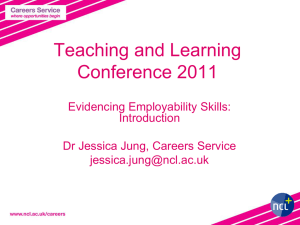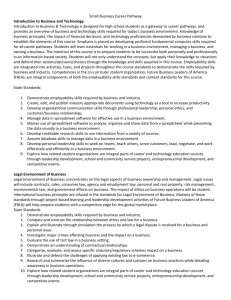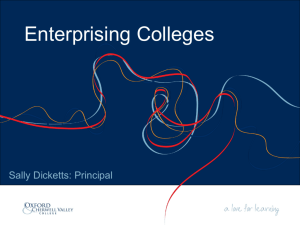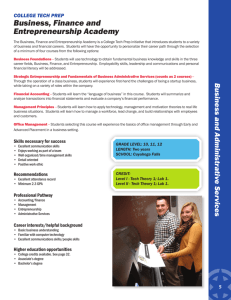Lesson Plan
advertisement
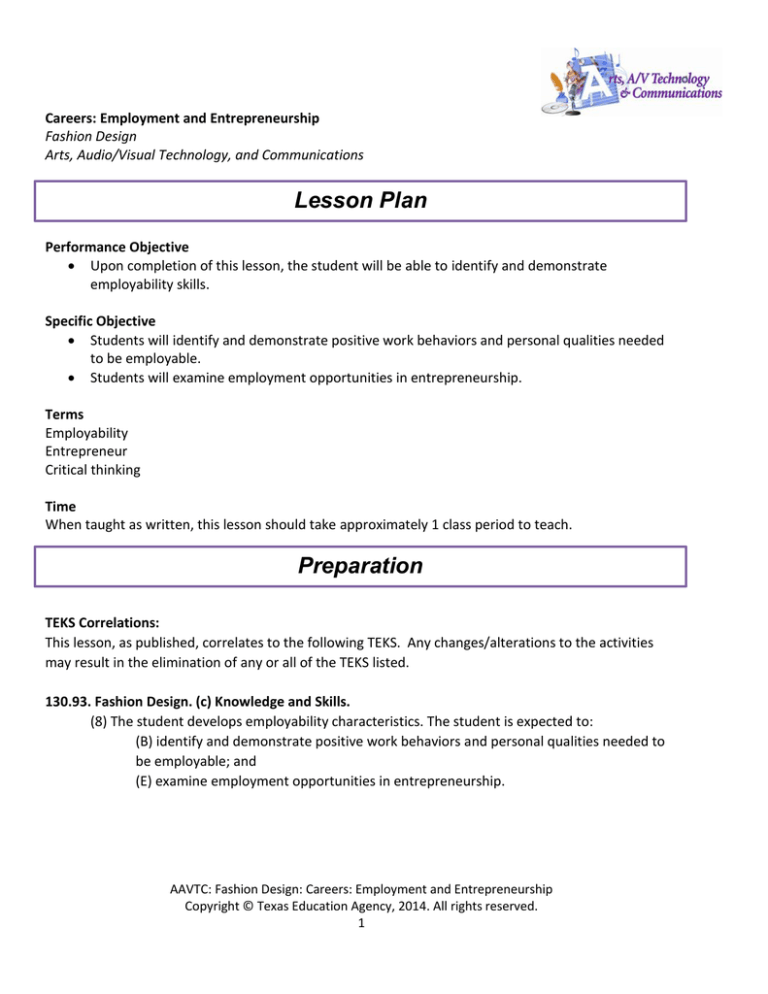
Careers: Employment and Entrepreneurship Fashion Design Arts, Audio/Visual Technology, and Communications Lesson Plan Performance Objective Upon completion of this lesson, the student will be able to identify and demonstrate employability skills. Specific Objective Students will identify and demonstrate positive work behaviors and personal qualities needed to be employable. Students will examine employment opportunities in entrepreneurship. Terms Employability Entrepreneur Critical thinking Time When taught as written, this lesson should take approximately 1 class period to teach. Preparation TEKS Correlations: This lesson, as published, correlates to the following TEKS. Any changes/alterations to the activities may result in the elimination of any or all of the TEKS listed. 130.93. Fashion Design. (c) Knowledge and Skills. (8) The student develops employability characteristics. The student is expected to: (B) identify and demonstrate positive work behaviors and personal qualities needed to be employable; and (E) examine employment opportunities in entrepreneurship. AAVTC: Fashion Design: Careers: Employment and Entrepreneurship Copyright © Texas Education Agency, 2014. All rights reserved. 1 Interdisciplinary Correlations: 110.32. English Language Arts and Reading, English II (9) Reading/Comprehension of Informational Text/Expository Text. Students analyze, make inferences and draw conclusions about expository text and provide evidence from text to support their understandings. Students are expected to: (B) distinguish between different kinds of evidence (e.g., logical, empirical, anecdotal) used to support conclusions and arguments in texts (C) make and defend subtle inferences and complex conclusions about the ideas in text and their organizational patterns Occupational Correlation (O*Net – www.onetonline.org/): Job Title: Fashion Designer O*Net Number: 27-1022.00 Reported Job Titles: Apparel Fashion Designer, Clothing Designer, Costume Designer, Product Developer Tasks: Direct and coordinate workers involved in drawing and cutting patterns and constructing samples or finished garments. Examine sample garments on and off models, modifying designs to achieve desired effects. Sketch rough and detailed drawings of apparel or accessories, and write specifications such as color schemes, construction, material types, and accessory requirements. Confer with sales and management executives or with clients to discuss design ideas. Identify target markets for designs, looking at factors such as age, gender, and socioeconomic status. Provide sample garments to agents and sales representatives, and arrange for showings of sample garments at sales meetings or fashion shows. Soft Skills: Active listening, speaking, writing, social perceptiveness, judgment and decision making Accommodations for Learning Differences It is important that lessons accommodate the needs of every learner. These lessons may be modified or accommodated to your students with learning differences by referring to the files found on the Special Populations page of this website. Preparation Review and familiarize yourself with the terminology and instructional materials. Search online for the video clip on waitressing and have it ready for viewing prior to the start of the lesson. AAVTC: Fashion Design: Careers: Employment and Entrepreneurship Copyright © Texas Education Agency, 2014. All rights reserved. 2 Search online for short movie clips that show both acceptable and unacceptable employee characteristics and behaviors in the fashion industry. Provide an area where students will perform their skits and provide any props that might be needed. Review and select an additional online class activity (if desired) to demonstrate a particular employability skill, such as critical thinking. References Liddell, L., & Samuels, C. (2004). Clothes and your appearance. Tinley Park, Illinois: The GoodheartWillcox Company, Inc. Instructional Aids Lesson Plan: Careers: Employment and Entrepreneurship Slide Presentation: Careers: Employment and Entrepreneurship Lists of possible skit scenarios Introduction Introduce the lesson by discussing employability skills. Ask students to identify both acceptable and unacceptable employee behaviors. Search online for a video clip about “Rachel waitressing”. After viewing the video clip, open a class discussion where students discuss Rachel’s skills. Compare and contrast the skills she had versus the skills she lacked as a waitress. Display and discuss slide presentation with class. Students may take notes. (Optional) Explain that students will participate in a group activity in which they will choose a scenario and present a skit demonstrating both good and bad employee attributes. *Note: Teachers may search online for additional activities for students to demonstrate employability skills. An example is critical thinking, since most employers consider this to be an important quality. You may search online for “teaching critical thinking skills” and select an activity from the list of websites that appear. AAVTC: Fashion Design: Careers: Employment and Entrepreneurship Copyright © Texas Education Agency, 2014. All rights reserved. 3 Outline MI Outline Go through the Slide Presentation with students. Discuss the following: I: Title slide Instructor Notes Begin Slide Presentation here. II. Overall Objectives a. What students will learn b. How students will demonstrate their learning III. Employability Skills Slide 2: Discuss what students will learn in this lesson. Slide 3: Students identify occupational skills and core academics IV. Employability Skills Slide 4: Students identify workplace basics and critical thinking skills V. Entrepreneurship Slide 5: Students identify entrepreneur opportunities VI. Student Assignment Slide 6: Teacher reviews students’ skills activity and expectations AAVTC: Fashion Design: Careers: Employment and Entrepreneurship Copyright © Texas Education Agency, 2014. All rights reserved. 4 Multiple Intelligences Guide Existentialist Interpersonal Intrapersonal Kinesthetic/ Bodily Logical/ Mathematical Musical/ Rhythmic Naturalist Verbal/ Linguistic Application Guided Practice Throughout the slide presentation, the teacher will stop periodically for the class to participate in short activities. After Slide #4, the teacher may choose to show short movie clips depicting both acceptable and unacceptable employee behaviors in the fashion industry. Students will identify and discuss which employability skills the character had and which ones were lacking. For Slide #5, students will discuss what skills are needed to be successful as an entrepreneur, the benefits and risks of entrepreneurship, and the fashion industry entrepreneur opportunities. Independent Practice Students will participate in group skits demonstrating employability skills. Summary Review Teacher will review information learned. Students may do a self-reflection activity to identify skills they feel they strongly possess and which skills they should improve before entering the workforce. Evaluation Informal Assessment Any and all of the following can be used as informal assessments… Check student participation in class discussions Prompting Check students’ understanding based on guided practice activities AAVTC: Fashion Design: Careers: Employment and Entrepreneurship Copyright © Texas Education Agency, 2014. All rights reserved. 5 Visual/ Spatial Formal Assessment Any and all of the following may be used as formal assessments… Notes on slide show presentation Assess student participation in the group activity Enrichment Extension The teacher may choose additional online activities for students on the topic of critical thinking skills needed in the workplace. Students may continue this lesson by completing an online search for skills needed for their desired profession. Students may also research their professions’ regular work tasks, job outlook, education, training required, and salary averages, which can be found at: www.onetonline.org AAVTC: Fashion Design: Careers: Employment and Entrepreneurship Copyright © Texas Education Agency, 2014. All rights reserved. 6 Skit Scenarios The following is a list of possible skit scenarios that small groups of students may act out to demonstrate both acceptable and unacceptable employability skills. The teacher or students may add to this list. 1. Scenario: A hair and beauty salon, or spa. Your group should demonstrate both acceptable and unacceptable employability skills that might come into play as employees interact with clients in a hair salon or spa. 2. Scenario: A fashion show. Your group is responsible for the backstage preparations for a fashion show and should demonstrate both acceptable and unacceptable skills that may come into play in this scenario. 3. Scenario: A high-end clothing store. Your group should demonstrate both acceptable and unacceptable employability skills that might come into play as employees interact with customers in a high-end clothing store. 4. Scenario: The make-up and perfume counter of a high-end department store. Your group should demonstrate both acceptable and unacceptable employability skills that might come into play as beauty analysts interact with customers at the make-up and perfume counter in a high-end department store. 5. Scenario: A clothing designer. Your group works with a clothing designer and should demonstrate both acceptable and unacceptable employability skills that might come into play in this scenario. AAVTC: Fashion Design: Careers: Employment and Entrepreneurship Copyright © Texas Education Agency, 2014. All rights reserved. 7

